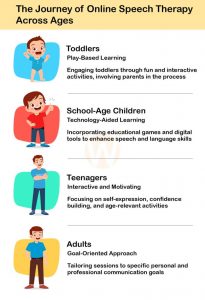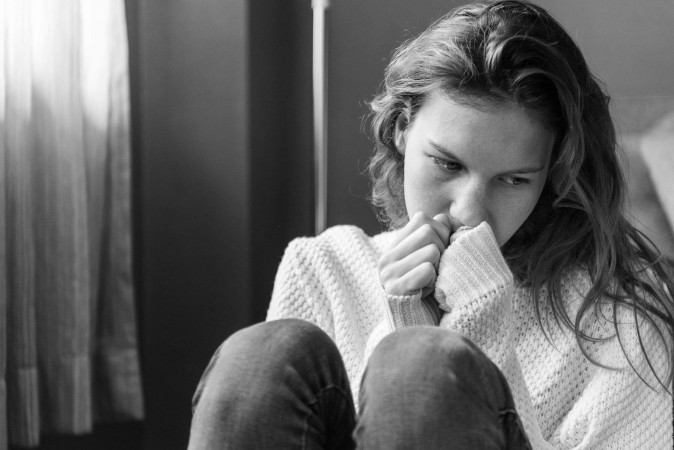Understanding Smiling Depression: The Hidden Struggle Behind the Smile
By Prapoorna M
Last Updated: March 5, 2024
Smiling depression is a unique and often misunderstood form of depression. Unlike the typical symptoms of sadness and withdrawal commonly associated with depression, smiling depression involves presenting a happy, content facade to the world while internally struggling with depressive feelings. This condition is not officially recognized in many diagnostic manuals, but mental health professionals acknowledge its existence and complexity.
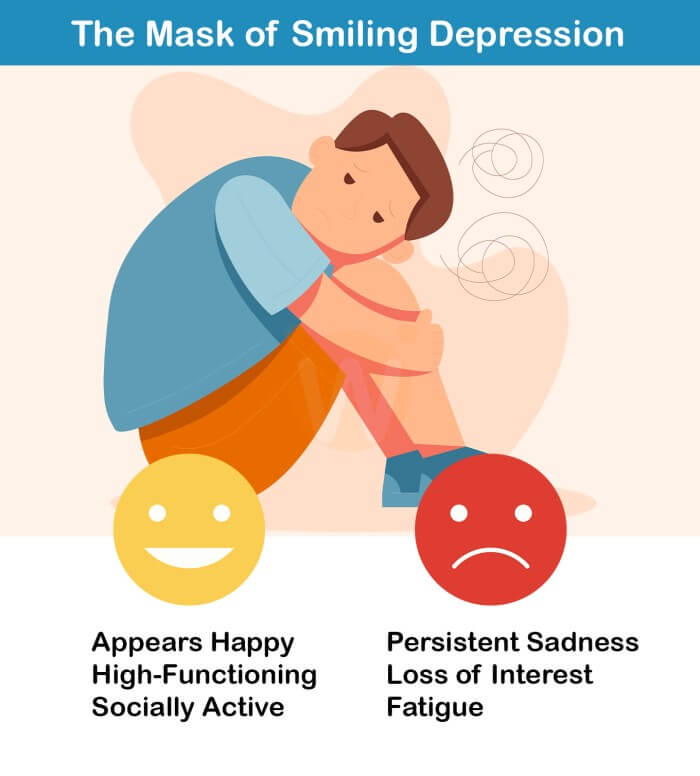
Understanding smiling depression is crucial because it challenges our conventional beliefs about what depression looks like. Those suffering from it often appear to have everything under control, making it difficult for others to recognize their internal struggle. This makes it a particularly insidious form of mental illness, as it often goes unnoticed and, consequently, untreated.
What is Smiling Depression?
Smiling depression refers to the experience of feeling depressed and hopeless internally while displaying a cheerful and content exterior to others. It is characterized by the contrast between the individual’s outward appearance and their inner emotional state. People with smiling depression typically manage to maintain their daily responsibilities, social lives, and professional duties, making it hard for others to detect their suffering.
This form of depression differs significantly from traditional forms, where symptoms like visible sadness, lack of energy, and withdrawal from social interactions are more apparent. In smiling depression, these symptoms are masked, and the individual might seem to lead a perfectly normal or even successful life.
The dichotomy between how individuals with smiling depression feel on the inside and how they appear on the outside is the core characteristic of this condition. This discrepancy can lead to a lack of understanding and support from others, as their struggle is not visible or easily recognized. It’s essential to spread awareness about this form of depression to ensure that those affected receive the understanding and help they need.

Recognizing the Symptoms
Recognizing the symptoms of smiling depression can be challenging due to its deceptive nature. Individuals with this condition often exhibit symptoms common to other forms of depression, but they do so behind a veneer of happiness or contentment. Common symptoms include:
- Persistent Sadness or Low Mood: Despite appearing happy, individuals may experience prolonged periods of sadness or a low mood.
- Loss of Interest: They may lose interest in activities they once enjoyed, but continue to participate in them to maintain appearances.
- Changes in Appetite and Sleep Patterns: Like other forms of depression, smiling depression can affect eating and sleeping habits, although these changes might be less noticeable to others.
- Fatigue or Low Energy: Even though they might seem energetic and active, they often feel tired or drained.
- Feelings of Hopelessness and Worthlessness: Internally, individuals may struggle with feelings of hopelessness and a lack of self-esteem.
- Difficulty Concentrating: Challenges with focus and concentration are common, but may be masked in public settings.
- Maintaining a High-Functioning Lifestyle: A key symptom specific to smiling depression is the ability to maintain a seemingly successful and active lifestyle, which can include excelling at work and maintaining social relationships.
These symptoms are often hidden in public because individuals with smiling depression are usually adept at managing their outward appearance. They might feel compelled to hide their true feelings due to fear of stigma, not wanting to burden others, or believing that acknowledging their depression is a sign of weakness.
Symptoms of Smiling Depression
| Symptom | Description | Public Perception |
|---|---|---|
| Persistent Sadness | Internal feeling of deep, ongoing sadness that is often concealed in public. | Hidden, not easily noticeable |
| Loss of Interest | Lack of interest in activities once enjoyed, yet might still participate to maintain normalcy. | Often masked or compensated |
| Fatigue | Consistent tiredness or low energy, despite possibly appearing energetic. | Concealed by a façade of activeness |
| Changes in Appetite and Sleep | Altered eating and sleeping patterns, which might be less apparent to others. | Subtle, not typically observed |
| Feelings of Hopelessness | Internal feelings of despair, which might not be expressed openly. | Rarely shared or expressed |
| Difficulty Concentrating | Struggles with focus and attention, possibly counteracted in public settings. | Frequently overlooked |
| High-functioning Lifestyle | Maintaining a seemingly successful, active lifestyle, contrary to internal struggles. | Perceived as capable and competent |
| Social Withdrawal | Tendency to withdraw from social interactions, though it might be less noticeable due to a maintained social facade. | Misinterpreted as busyness or reserve |
Who is at Risk?
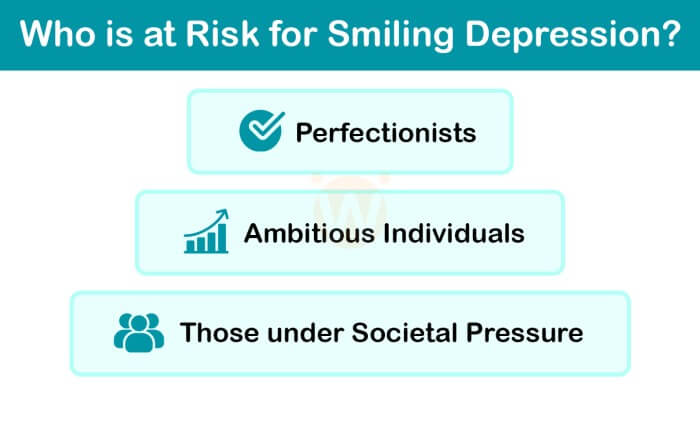
Certain demographic and psychological profiles are more at risk for smiling depression:
- Perfectionists: Individuals who are perfectionists or have a strong desire for control may be more susceptible to smiling depression. Their high standards and fear of failure can contribute to internal stress while they maintain an external appearance of having everything together.
- Ambitious Individuals: Those with ambitious goals or high personal and professional standards may also be at risk. They often feel the need to present a successful image to the world, regardless of their internal struggles.
- Cultural and Societal Factors: Societal expectations and cultural norms can play a significant role in smiling depression. In some cultures, showing signs of mental distress is stigmatized, leading individuals to mask their true feelings. Additionally, gender expectations can influence how individuals express emotions, with men, in particular, feeling societal pressure to appear strong and unemotional.
Understanding these risk factors is crucial for identifying and supporting individuals who might be suffering from smiling depression. Recognizing that this condition can affect anyone, regardless of how successful or happy they seem, is a vital step in providing appropriate help and resources.
The Dangers of Smiling Depression
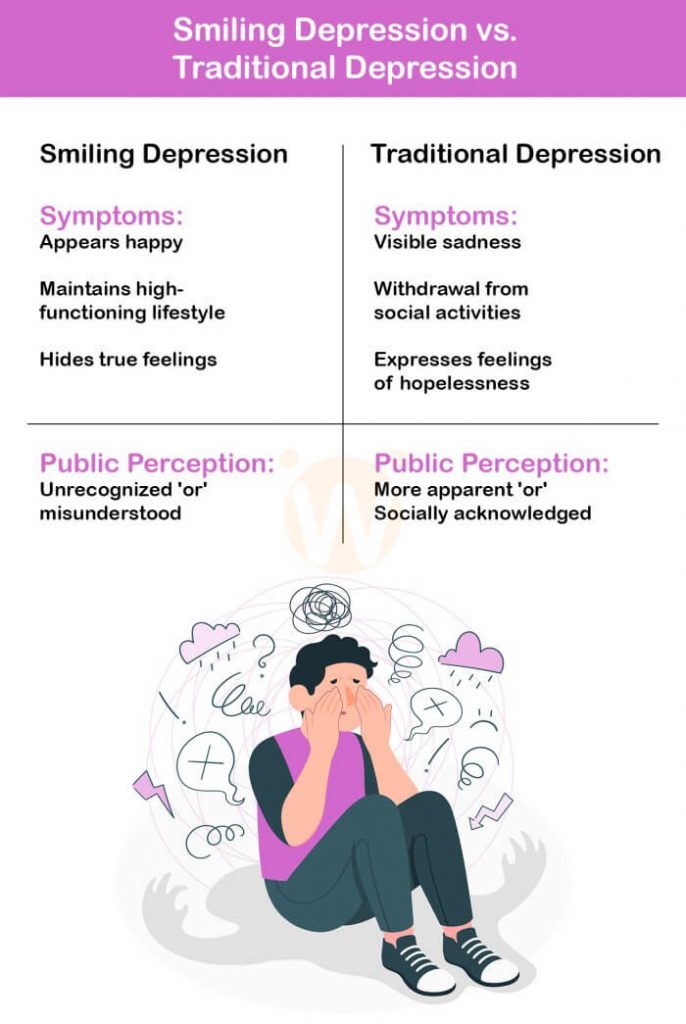
Smiling depression poses unique dangers, making it a particularly concerning mental health issue. Its deceptive nature often leads to several risks:
- Difficulty in Diagnosis: Since individuals with smiling depression typically do not exhibit the conventional symptoms associated with depression, it is much harder for healthcare professionals, friends, and family to recognize and diagnose the condition.
- Higher Potential for Suicide: One of the most alarming risks of smiling depression is an increased potential for suicide. The combination of depressive feelings and a facade of happiness can lead to a situation where individuals are more likely to plan and act on suicidal thoughts, as their suffering goes unnoticed.
- Lack of Treatment and Support: Due to the difficulty in recognizing smiling depression, individuals often do not receive the necessary support and treatment. This lack of intervention can exacerbate their condition over time.
The hidden nature of smiling depression makes it imperative for society to gain a better understanding of this condition, to recognize the signs, and to provide appropriate support.
Causes and Triggers
The causes and triggers of smiling depression are varied, often involving a combination of psychological, environmental, and social factors:
- Personality Traits: Individuals with certain personality traits, such as perfectionism, high ambition, or a propensity to suppress emotions, are more susceptible to smiling depression.
- Life Events: Major life events, such as the loss of a loved one, job loss, or the end of a significant relationship, can trigger smiling depression. The pressure to appear strong or unaffected in the face of such events can lead individuals to mask their true feelings.
- Social Pressures: The pressure to appear happy and successful, often amplified by social media, can be a significant trigger. Constant exposure to the curated happiness of others can create unrealistic expectations and feelings of inadequacy.
- Cultural Expectations: In many cultures, there is a stigma associated with mental health issues, leading individuals to hide their symptoms. Additionally, gender roles and expectations can play a part, particularly for men who may feel societal pressure to avoid showing vulnerability.
Understanding these causes and triggers is crucial in identifying and assisting those who may be suffering from smiling depression. It helps in creating a supportive environment where individuals feel safe to express their true emotions and seek help.
The Role of Social Media and Cultural Expectations
Social media and societal expectations play a significant role in exacerbating the issue of smiling depression. In today’s digital age, social media platforms have become a showcase for ‘highlight reels’ of people’s lives, often portraying an idealized version of reality. This creates several challenges:

- Pressure to Appear Perfect: The constant stream of perfect images and happy moments on social media can create immense pressure to appear happy and successful. This often leads individuals to hide their true feelings and contribute to the façade of a perfect life.
- Comparison and Inadequacy: Continuous exposure to others’ seemingly perfect lives can lead to feelings of inadequacy, jealousy, and low self-esteem. For someone already struggling with smiling depression, this can intensify their internal conflict.
- Cultural Expectations: Societal norms and cultural expectations about how one should behave, feel, and express emotions can contribute to smiling depression. In many cultures, expressing negative emotions or admitting to mental health struggles is stigmatized, pushing individuals to mask their true feelings.
Recognizing the impact of social media and societal pressures is essential in understanding and addressing smiling depression. It’s crucial to foster a culture of openness and authenticity, both online and in real life, to combat these pressures.
Treatment and Getting Help
Treating smiling depression involves a holistic approach that includes therapy, medication, and community support. Here are some treatment options and guidance on seeking help:
- Therapy: Psychological counseling, particularly cognitive-behavioral therapy (CBT), can be highly effective. Therapy provides a safe space to explore feelings and develop coping strategies.
- Medication: Antidepressants may be prescribed to help manage symptoms, especially in cases of severe depression. It’s important to have ongoing consultations with a healthcare provider when using these medications.
- Seeking Help: Overcoming the stigma of mental illness is a critical step in seeking help. It’s important to recognize that reaching out for assistance is a sign of strength, not weakness.
- Support Systems: Building a strong support system of friends, family, and peers can provide the necessary emotional support.
- Approaching Someone Who Might Be Suffering: If you suspect someone is experiencing smiling depression, approach them with empathy and without judgment. Offer support and encourage them to seek professional help.
It is vital to create an environment where discussing mental health is normalized, and seeking help is seen as a positive and proactive step. Remember, smiling depression is treatable, and with the right support, individuals can lead fulfilling lives.
Treatment Options for Smiling Depression
| Treatment Type | Description | Effectiveness |
|---|---|---|
| Therapy | Psychological counseling, such as cognitive-behavioral therapy, focusing on altering thought and behavior patterns. | Highly effective, especially for long-term management of symptoms. |
| Medication | Use of antidepressants to help regulate mood and alleviate some of the symptoms of depression. | Varies by individual; can be highly effective, especially in combination with therapy. |
| Lifestyle Changes | Includes regular exercise, a balanced diet, adequate sleep, and stress reduction techniques. | Effective as a complementary approach; can significantly improve overall wellbeing. |
| Mindfulness and Relaxation Techniques | Practices like yoga, meditation, and deep breathing exercises to manage stress and emotional turmoil. | Useful for reducing stress and improving mood; effectiveness increases with regular practice. |
| Support Groups | Participation in groups with others who are facing similar challenges, providing a space for shared experiences and empathy. | Effective for emotional support and reducing feelings of isolation. |
| Professional Help | Seeking help from a psychiatrist or psychologist for tailored treatment plans. | Crucial for accurate diagnosis and treatment; highly recommended for all severity levels. |
Personal Stories and Experiences
Personal stories can provide powerful insights into the reality of smiling depression. Here are anonymized accounts that reflect the diverse experiences of those who have battled with this condition:
- John’s Story: John, a successful lawyer, always appeared confident and happy to his colleagues. However, in private, he struggled with deep feelings of inadequacy and sadness. Despite his career success, he felt empty and unfulfilled, masking his pain with a constant smile at work.
- Emma’s Account: Emma, a college student known for her bright personality and academic achievements, might remind us of the importance of marital bliss and relationship health as she was silently fighting smiling depression. She shared how maintaining a facade of happiness was exhausting and how it prevented her from seeking the help she desperately needed.
- Mike’s Experience: As a father and husband, Mike felt immense pressure to be the ‘rock’ of his family. His story illustrates how societal expectations around masculinity contributed to his smiling depression and the challenges he faced in acknowledging and addressing his mental health issues.
These stories underscore the hidden nature of smiling depression and the importance of recognizing that anyone can be affected, regardless of their outward appearance.
Coping Strategies and Support
Coping with smiling depression requires a combination of self-care, support, and professional intervention. Here are some strategies and resources:
- Self-Reflection and Acknowledgment: Recognizing and accepting your feelings is the first step towards recovery. Journaling or meditative practices can aid in this process.
- Seeking Professional Help: Consulting a mental health professional is crucial. They can provide tailored therapy and treatment plans.
- Building a Support Network: Engaging with friends, family, or support groups can provide emotional support and understanding.
- Lifestyle Adjustments: Regular exercise, a balanced diet, and sufficient sleep can significantly improve mental health.
- Mindfulness and Relaxation Techniques: Practices like yoga, meditation, and mindfulness can help manage stress and emotional turmoil.
Access to resources such as mental health hotlines, counseling services, and online support forums should be readily available for those in need.
Conclusion
Smiling depression, a complex and often misunderstood condition, involves hiding one’s true feelings of depression behind a facade of happiness. Recognizing its symptoms, understanding the risks, and being aware of the causes and triggers are crucial steps in addressing this condition. Treatment involves therapy, medication, and building a strong support system. Personal stories highlight the diverse experiences of those affected and emphasize the importance of empathy and understanding.
It is essential to remember that smiling depression is treatable, and reaching out for help is a sign of courage and strength. By fostering open discussions about mental health and challenging societal norms, we can create a supportive environment for those battling smiling depression. There is always hope, and with the right support and resources, individuals can navigate their way to recovery and wellbeing.
Frequently Asked Questions on Smiling Depression
1. What is smiling depression?
Smiling depression is a term used to describe individuals who suffer from depression but appear to be happy or content in their public life. They often maintain a high-functioning lifestyle despite struggling internally with depressive feelings.
2. How is smiling depression different from other forms of depression?
Unlike typical depression, which often manifests as visible sadness and withdrawal, smiling depression involves masking depressive symptoms with a happy exterior. This can make it harder to recognize and diagnose.
3. Can smiling depression be as serious as other types of depression?
Yes, it can be just as serious, if not more so, due to its hidden nature. It poses significant risks, including a higher potential for suicide, as the individuals suffering are often not recognized as needing help.
4. What are some common symptoms of smiling depression?
Symptoms include feelings of sadness, loss of interest in enjoyable activities, changes in appetite and sleep, fatigue, and feelings of hopelessness, all while maintaining a facade of happiness and normalcy.
5. Who is most at risk for smiling depression?
Individuals who are perfectionists, highly ambitious, or feel societal pressure to appear strong and unemotional are at a higher risk. Cultural and societal expectations can also play a significant role.
6. How can social media influence smiling depression?
Social media can exacerbate smiling depression by creating pressures to present a perfect and happy life. This can lead to feelings of inadequacy and intensify the internal struggle of someone with smiling depression.
7. What should I do if I think someone I know has smiling depression?
Approach them with empathy and understanding. Encourage open communication and suggest seeking professional help. Be supportive but avoid forcing the conversation.
8. What are the treatment options for smiling depression?
Treatment options include therapy, particularly cognitive-behavioral therapy, medication, and support from friends and family. Lifestyle changes like regular exercise and mindfulness practices can also be beneficial.
9. Is it possible to recover from smiling depression?
Yes, with appropriate treatment and support, individuals with smiling depression can recover. Recognizing the condition and seeking help are crucial first steps.
10. How can I support someone with smiling depression?
Offer a listening ear, be non-judgmental, and encourage them to seek professional help. Being present and offering practical support, like accompanying them to therapy sessions, can also be helpful.
About the Author:
Prapoorna Mangalampalli, Psychologist
Prapoorna, an author with dual master’s degrees in Psychology and English, excels in exploring and enhancing human experiences. Her writing, characterized by deep empathy and insight, primarily focuses on the complexities of counseling, spanning areas such as online, marital, relationship, child, family, and career counseling. Specialized training in various counseling sectors underscores her dedication to positive change. In her blogs, Prapoorna offers valuable guidance and a unique perspective for parents of children with Autism and special needs, creating a supportive community in this realm.
Book your Free Consultation Today
Parent/Caregiver Info:
Client’s Details:
* Error Message







